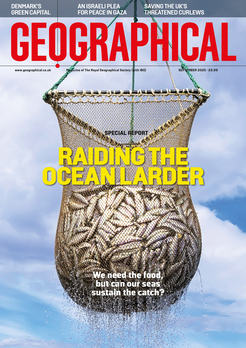


From climate change to Gaza, the pursuit of ‘balance’ often misleads rather than informs, warns Andrew Brooks
In British politics, there is a lot of debate around how to tackle climate change. The Reform Party is riding high in the polls and one of Nigel Farage’s few policies is a pledge to scrap net zero and cut renewable-energy subsidies. In contrast, the government is championing environmental initiatives, and Chancellor Rachel Reeves has earmarked billions of pounds for the green economy – setting Labour apart from both Reform and the Conservative opposition.
The hostility to net zero within the political right, and the favourable media coverage it receives, is alarming. Meanwhile, the government’s stance is welcome but doesn’t go far enough.
The science on climate change is clear and the need for immediate action on emissions is beyond doubt. The current argument over net zero is reminiscent of past climate debates, but it’s also indicative of a broader pattern – from environmental topics to geopolitics – where there is a reactionary impulse to ‘balance out’ and neutralise progressive views.
In 2004, Maxwell Boykoff and his brother Jules published a landmark academic paper, Balance as Bias: Global Warming and the US Prestige Press, in Global Environmental Change. The Boykoffs argued that coverage of climate change from 1988 to 2002 in leading American newspapers – including the New York Times and the Washington Post – was misleading the public. The way in which the media presented global warming led to a significant divergence of popular understanding away from scientific consensus. Conversely, the journalistic norm of consistently seeking balance led to more than a decade of biased coverage. When a news story broke containing new evidence of anthropogenic climate change, articles would typically include counter perspectives from climate change deniers. This presented the topic as a contested issue and encouraged the readership to doubt scientific analysis. Despite the huge body of peer-reviewed evidence, the media was biasing the public against the validity of an inconvenient truth. A similar pattern of balance-as-bias was present in the British media, and the memory that climate change was once a contentious issue may linger in the minds of older voters. Reform UK’s position on the environment is fossilized in the recent past and recalls this time when global warming was publicly debated.
In my own work in political geography, I’ve experienced attempts to ‘balance’ out my research. Writing with my co-author, Mark Griffiths, on the ongoing genocidal violence in Palestine, we argued that the term ‘apartheid’, frequently applied to Israeli policies against the Palestinian people, is insufficient to explain the suffering. This was in a contribution to the journal Political Geography, and was met with a response piece by Yaniv Reingewertz, who argued that terms including ‘genocide’ and ‘apartheid’ were inappropriate, as the situation in Gaza is ‘complex’ and ‘nuanced’, and that less charged language should be used. Written in measured academic tones, this antithesis, read in tandem with our work, offers ‘balance’ to our original argument and makes our conclusions feel contentious. However, Reingewertz’s intervention was an academic outlier when set against work published across the field of political geography on Israel/Palestine.
Read more articles from Andrew Brooks…
More widely – and away from academic debates – we must be wary of attempts to balance out the use of terms such as ‘genocidal’ to describe the actions the Israeli state has taken against the Palestinian people. Masses of evidence from human rights organisations and practitioners of law are building the case for genocide: in 2023, the UN reported that ‘Israel has already carried out mass ethnic cleansing of Palestinians’; the International Criminal Court has issued arrest warrants for Prime Minister Netanyahu; and, damningly, two far-right Israeli ministers have been sanctioned by the UK over ‘repeated incitements of violence against Palestinian communities’ in the occupied West Bank. One of these ministers – Bezalel Smotrich – had made the comment that the potential deaths of two million Palestinians in the blockaded Gaza Strip from hunger may be justifiable. Despite this evidence, when the war is covered in the media, reports on the loss of Palestinian life are met with a balancing perspective from Israel, where the horrendous events of 7 October are drawn into the debate, and the current moment is characterised as Israel’s ‘retaliation’. Yet the violence of that day in autumn 2023, to use the words of the UN Secretary-General António Guterres, ‘did not happen in a vacuum’ and must be set in a context of ‘56 years of suffocating occupation’.
Climate change deniers rarely get a platform in the mainstream media, or when journalists report on Russia’s invasion of Ukraine the perspectives of the Kremlin aren’t taken as a valid part of the conversation. However, when the cameras turn to Palestine, there is an impulse towards balanced coverage that has the effect of lessening the human suffering in Gaza.




